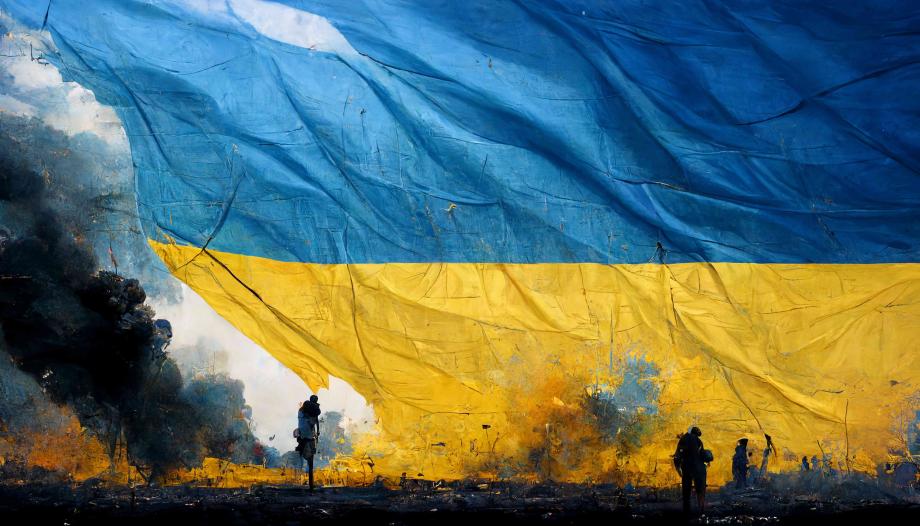Letting Ukraine lose would bring the next global war closer

Some political forces in Europe and North America are arguing for the cessation of support for Ukraine to facilitate peace between Moscow and Kyiv and to stop the situation from spiralling out of control towards “World War 3.” While the desire for peace in Ukraine is near universal outside of Russia and its allies, granting the aggressor what it wants will only degrade the security of Western nations, as it did in the late 1930s, argues GLOBSEC Research Fellow Patrik Szicherle.
On September 30, 1938, then-British Prime Minister Neville Chamberlain met enthusiastic crowds on his return to London from Germany. The British premier had just signed the Munich agreement allowing Nazi Germany to occupy the Sudetenland and an “Anglo-German Agreement” about “the symbolic desires of our two peoples never to go to war again.” Standing on the second floor of No. 10 Downing Street, Chamberlain told the jubilant crowds – many of whom must have had vivid memories of the Great War – that the agreement was “peace for our time.” That peace, however, lasted less than a year until Germany attacked Poland on September 1, 1939. Britain’s (and France’s) appeasement policy towards Germany was driven by a desire to avoid bloodshed, but it lacked an understanding of the German chancellor’s true character and goals. At the time, democratic countries tried to appease autocrats by simply granting them what they wanted until London and Paris had no other choice but to fight back.
Putin is as unpredictable and ambitious as the German chancellor was in the late 1930s. In 2024, the West should have a much better understanding of contemporary Russia. Vladimir Putin, after all, ordered the invasion of Ukraine based on the advice of a few like-minded advisors. He launched the largest war Europe has seen since 1945 with an unprepared military, blindsiding his own officials. The Russian president’s reliance on ‘yes men’ in his security establishment and his own conspiratorial mindset pose further dangers. He openly suggested that his ambitions were not limited to Ukraine, as he had demanded NATO’s forces to be withdrawn behind the Alliance’s 1997 borders before the invasion. Moreover, the Kremlin is issuing nuclear threats against NATO almost every day.
The results of GLOBSEC’s 2024 Trends polling show that, on average, 74% of Central and Eastern European respondents in Bulgaria, Czechia, Estonia, Latvia, Lithuania, Poland, Romania, and Slovakia agree that providing military equipment to Ukraine helps the latter defend itself. However, the poll also highlights that threats of a direct NATO-Russia confrontation do affect these societies: 47% agree that the provision of military equipment to Ukraine provokes Russia and brings war closer. In Latvia, the proportion of those who agree with this sentiment went from 29% in 2023 to 41% in 2024. Even in Poland, about a third of the population has such concerns.
Yet, appeasing Russia by forcing Kyiv to agree to a lopsided “peace deal” would not be a long-term solution. In fact, such actions would only help Russia get stronger and push further in its desire to challenge the West. It is certain that with Ukrainian resistance broken, Moscow would return to its previous demands against NATO. The Russia-linked provocations against EU and NATO members would likely continue and possibly intensify. Let us not forget that only two weeks before the full-scale invasion of Ukraine, the Russian Ministry of Foreign Affairs called statements about a potential war “absurd.” This is how credibly anyone should take declarations by Putin that he would not attack anyone from the Western Alliance. This does not mean that a Russian attack against the Baltics is imminent. But it does highlight that the West, as a whole, should continue preparing for confrontation. This means rejuvenating the Western arms industry, improving training and equipment for armed forces across the West and working on the military recruitment effort.
Notable and fast investments into (primarily) European armies and the arms industry would already improve NATO and EU citizens’ sense of security. Continued backing for Ukraine is equally important. However, leaders must also understand that simply taking the moral high ground will not ensure continued public support for Ukraine. Leaders need to regularly explain to their populations how financing Ukraine’s defence benefits their own respective countries in the long term. They need to understand that supporting a war is expensive but not as expensive as being in one. Listening to so-called peace advocates and letting Russia win would only make the Kremlin stronger and braver. Only by showing strength to Russia and helping Ukraine fight can the West ensure that the world is not pushed into a brutal global confrontation for the third time.

Research Fellow, Centre for Democracy & Resilience